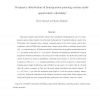Free Online Productivity Tools
i2Speak
i2Symbol
i2OCR
iTex2Img
iWeb2Print
iWeb2Shot
i2Type
iPdf2Split
iPdf2Merge
i2Bopomofo
i2Arabic
i2Style
i2Image
i2PDF
iLatex2Rtf
Sci2ools
CORR
2008
Springer
2008
Springer
Occupancy distributions of homogeneous queueing systems under opportunistic scheduling
This paper analyzes opportunistic schemes for transmission scheduling from one of n homogeneous queues whose channel states fluctuate independently. Considered schemes consist of an LCQ policy that transmits from a longest connected queue in the entire system, and its lowcomplexity variant LCQ(d) that transmits from a longest queue within a randomly chosen subset of d 1 connected queues. A Markovian model is studied where mean packet transmission time is n-1 and packet arrival rate is < 1 per queue. Transient and equilibrium distributions of queue lengths are obtained in the limit as the system size n tends to infinity. It is shown that under LCQ almost all queues are empty in equilibrium, maximum queue length is 1, and the overall system occupancy is (1) as n . Limiting distribution of the system occupancy is characterized. Limiting queue length distributions under LCQ(d) are also given. It is shown that if d is fixed then the system occupancy is (n) and the queue length distri...
| Added | 09 Dec 2010 |
| Updated | 09 Dec 2010 |
| Type | Journal |
| Year | 2008 |
| Where | CORR |
| Authors | Murat Alanyali, Maxim Dashouk |
Comments (0)

